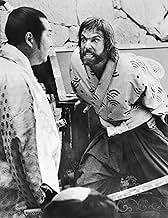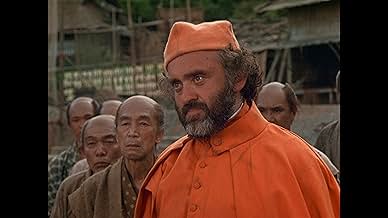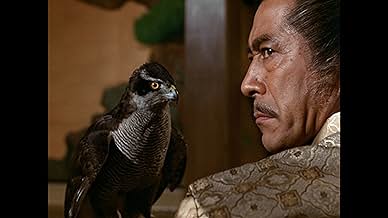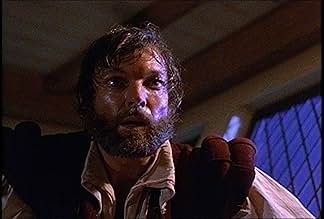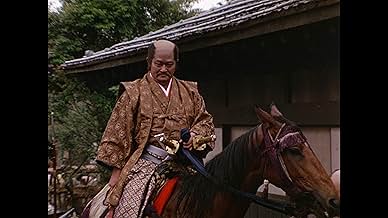Un navigateur anglais devient à la fois acteur et pion dans les jeux politiques complexes du Japon féodal.Un navigateur anglais devient à la fois acteur et pion dans les jeux politiques complexes du Japon féodal.Un navigateur anglais devient à la fois acteur et pion dans les jeux politiques complexes du Japon féodal.
- A remporté 3 prix Primetime Emmy
- 8 victoires et 13 nominations au total
Parcourir les épisodes
Histoire
Le saviez-vous
- AnecdotesWill Adams, the real-life English sea captain and adventurer who made it to Japan in the 16th century, has a street named after him in Japan: Anjin-Cho.
- GaffesIn the opening shot, when the last of the five remaining Dutch vessels sails the Pacific, it carries the Dutch flag, red stripe on top, white in the middle and bottom's blue. This is "in the year of our Lord one thousand five hundred and ninety-eight..." but at that time, the top stripe on the Prince's Flag was orange as it first appeared in the 1570s. It was changed to red in the mid-17th century but it took until 1796, almost a century after the series is supposed to be set, before red white and blue were officially announced to be the official colors.
- Citations
[after Blackthorne's guard prevented an assassination attempt by Rodrigues]
Pilot-Major John Blackthorne: Captain Yoshinaka was right to search him. Was that your idea?
Lady Toda Buntaro - Mariko: Please excuse me, but I was afraid for you.
Pilot-Major John Blackthorne: Sad, isn't it? Not being able to trust anyone.
Lady Toda Buntaro - Mariko: It is not sad, Anjin-san. It is just one of life's most important rules.
- Autres versionsOriginally a twelve-hour TV miniseries narrated by Orson Welles, it was later reissued for television in a somewhat shortened version with narration by Anne Bancroft. Shogun was re-edited into a 125-minutes movie for USA network TV with the addition of a new voice over narrated by Orson Welles
- ConnexionsEdited into Shogun (1980)
- Bandes originalesBLACKTHORNE'S SHANTY
Words and Music by Eric Bercovici
Commentaire en vedette
There was a time in TV when the mini-series was king. They were great prestige products for the networks who, risking immense financial expenditure, hoped to create a cinematic masterpiece on a small screen.
SHOGUN may be the ultimate expression of this neglected TV format. Based on James Clavell's sweeping epic novel of the same name, it succeeds fully in transporting the viewer to another time and place. Through John Blackthorne's eyes (Richard Chamberlain in a now iconic performance, blending moments of delightful scenery chewing with moments of genuine emotion and subtlety), we become ever more involved in the political dealings of the Japanese nobility and the mixed motives of the Jesuits.
One of the great triumphs of SHOGUN is to ensnare the viewer despite long segments in Japanese with no subtitles. The filmmakers were trying to tell the story through Blackthorne's eyes and save for a few moments of narration explaining the dialog, we are left to slowly comprehend the action at the same pace as Blackthorne. It's a device which works wonderfully well, leaving the viewer to figure out what's going on through context and character.
In addition to Chamberlain, SHOGUN is replete with glorious performances. Toshiro Mifune's Toranaga, a Japanese nobleman with grand political designs, possesses great power and yet Mifune's performance is also very nuanced. Toranaga is a man who's mind is always trying to figure three steps ahead and we see this aspect of Toranaga's personality in Mifune's work- a considerable feat considering his dialog is exclusively in Japanese and without subtitles.
Yoko Shimada plays Mariko with a captivating beauty and ethereal grace. Becoming Blackthorne's interpreter and love interest, we cannot take our eyes off of her. Her performance is made doubly impressive by the fact that Ms. Shimada spoke no English and had to be told what her lines met with great care.
Additionally, John-Rhys Davies gives a wonderfully bravura turn as Rodrigues and Damien Thomas gives his Father Alvito real depth and dignity.
SHOGUN does show its age. The quality of the video image does have a bit of that TV glow to it and Maurice Jarre's score, seeming so lush back in 1980, sounds as if it were recorded by a very small third-rate band in a backwater recording studio- it reeks of TV. Still, these are comparatively minor quibbles to an otherwise completely engrossing epic. SHOGUN succeeds mightily in taking the viewer into a strange land filled with wonder and intrigue. By the end, it's a land you aren't ready to leave- perhaps the ultimate compliment for any film.
SHOGUN may be the ultimate expression of this neglected TV format. Based on James Clavell's sweeping epic novel of the same name, it succeeds fully in transporting the viewer to another time and place. Through John Blackthorne's eyes (Richard Chamberlain in a now iconic performance, blending moments of delightful scenery chewing with moments of genuine emotion and subtlety), we become ever more involved in the political dealings of the Japanese nobility and the mixed motives of the Jesuits.
One of the great triumphs of SHOGUN is to ensnare the viewer despite long segments in Japanese with no subtitles. The filmmakers were trying to tell the story through Blackthorne's eyes and save for a few moments of narration explaining the dialog, we are left to slowly comprehend the action at the same pace as Blackthorne. It's a device which works wonderfully well, leaving the viewer to figure out what's going on through context and character.
In addition to Chamberlain, SHOGUN is replete with glorious performances. Toshiro Mifune's Toranaga, a Japanese nobleman with grand political designs, possesses great power and yet Mifune's performance is also very nuanced. Toranaga is a man who's mind is always trying to figure three steps ahead and we see this aspect of Toranaga's personality in Mifune's work- a considerable feat considering his dialog is exclusively in Japanese and without subtitles.
Yoko Shimada plays Mariko with a captivating beauty and ethereal grace. Becoming Blackthorne's interpreter and love interest, we cannot take our eyes off of her. Her performance is made doubly impressive by the fact that Ms. Shimada spoke no English and had to be told what her lines met with great care.
Additionally, John-Rhys Davies gives a wonderfully bravura turn as Rodrigues and Damien Thomas gives his Father Alvito real depth and dignity.
SHOGUN does show its age. The quality of the video image does have a bit of that TV glow to it and Maurice Jarre's score, seeming so lush back in 1980, sounds as if it were recorded by a very small third-rate band in a backwater recording studio- it reeks of TV. Still, these are comparatively minor quibbles to an otherwise completely engrossing epic. SHOGUN succeeds mightily in taking the viewer into a strange land filled with wonder and intrigue. By the end, it's a land you aren't ready to leave- perhaps the ultimate compliment for any film.
- actorman_us
- 4 juill. 2005
- Lien permanent
Meilleurs choix
Connectez-vous pour évaluer et surveiller les recommandations personnalisées
- How many seasons does Shogun have?Propulsé par Alexa
Détails
- Date de sortie
- Pays d’origine
- Langues
- Aussi connu sous le nom de
- James Clavell's Shogun
- Lieux de tournage
- sociétés de production
- Consultez plus de crédits d'entreprise sur IMDbPro
Contribuer à cette page
Suggérer une modification ou ajouter du contenu manquant



